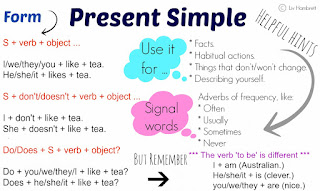FUTURE TENSE
The simple future tense will always follow “shall+ verb+ construct or will + verb construct”.
Example Sentences
Using "Will" or “shall”
1.
I shall cry when it's time to leave.
2.
Aileen will complete her first novel this
October.
3.
Kanye West will run for president - or will he?
4.
They will bake the pies.
5.
We shall arrive in the evening.
Complete the
following sentences using the simple future tense forms of the verbs given in
the brackets.
1. In two days, I ………………….. my results.
shall know
would know
will be knowing
2. ‘There is the doorbell.’ ‘I ………………..’
would go
am going
shall go
3. You ..................... this decision.
will be regretting
will regret
would regret
4. We ………………….. what happened to her.
would never know
shall never know
will never be knowing
5. The whole nation ……………….. proud of you.
is
will be
would be
6. That …………………. our gift to the school.
will be
would be
will have been
7. Kind words ………………….. others joy.
will give
would give
will be giving
8. This piece of wisdom ………………. you ten dollars.
will cost
would cost
will be costing
9. You ..................... my position.
will never understand
would never understand
never understand
10. Someday I ........................ a novel.
will be writing
shall write
would write
11. I ...................... this.
shall not permit
would not permit
will not be permitting
12. He .....................… the test.
cannot pass
will not pass
will not be passing
Answers
1. In two days, I shall know my results.
2. ‘There is the doorbell.’ ‘I shall go.’
3. You will regret this decision.
4. We will never know what happened to her.
5. The whole nation will be proud of you.
6. That will be our gift to the school.
7. Kind words will give others joy.
8. This piece of wisdom will cost you ten dollars.
9. You will never understand my position.
10. Someday I shall write a novel.
11. I shall not permit this.
12. He will not pass the test.
Put the verbs into
the correct form (simple future)
James, 18 years old, asked an ugly fortune teller about his
future. Here is what she told him:
You (be) very happy.
You (get) a lot of
money.
You (buy) a beautiful
house.
Your friends (envy)
you.
You (meet) a
beautiful girl.
You (marry) her.
You and your wife (travel)
around the world.
People (serve) you.
They (not/refuse) to
make you happy.
But all this (happen / only)
when you are 70 years old.
Answers
·
will be
·
will get
·
will buy
·
will envy
·
will meet
·
will marry
·
will travel
·
will serve
·
will not refuse
·
will happen only
Change the verb into
the future form:
1. I (help) you with your homework.
2. She (be) here very soon.
3. They (come) at 8 o'clock.
4. You (call) me next week.
5. I (use) the money wisely.
6. We (return) as soon as possible.
7. It (rain) tomorrow.
9. Ralf (pay) for it.
10. Amanda (win) this game.
11. Maybe we (stay) at home.
12. They (bake) some cakes.
13. I (take) you with me next month.
14. Ashley (stay) at home tonight.
15. It (be) very hot this summer.
1. I (help) you with your homework.
2. She (be) here very soon.
3. They (come) at 8 o'clock.
4. You (call) me next week.
5. I (use) the money wisely.
6. We (return) as soon as possible.
7. It (rain) tomorrow.
9. Ralf (pay) for it.
10. Amanda (win) this game.
11. Maybe we (stay) at home.
12. They (bake) some cakes.
13. I (take) you with me next month.
14. Ashley (stay) at home tonight.
15. It (be) very hot this summer.
ANSWERS
·
shall take
·
will stay
·
will be
·
shall help
·
will be
·
will come
·
will call
·
shall use
·
shall return
·
will rain
·
will pay
·
will win
·
shall stay
·
will bake











